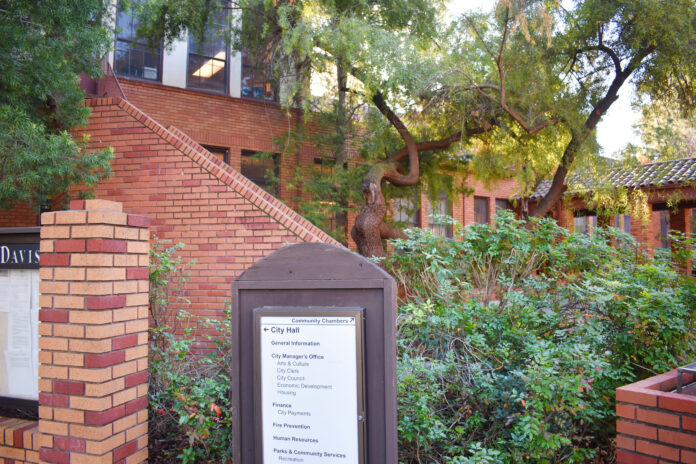The council discussed housing funds, the Urban Forest Management Plan and the American Rescue Plan
By ALEX UPTON — city@theaggie.org
On March 21, the Davis city council held its last council meeting of the month to discuss current housing issues in relation to the city’s American Rescue Plan funding and the new Urban Forest Management Plan.
Councilmembers began the meeting with a series of presentations, including taking time to recognize March as Colorectal Cancer Awareness Month, Developmental Disabilities Awareness Month and Red Cross Month.
Vice Mayor Josh Chapman discussed the importance of screening for and increasing education about colorectal cancer. Mayor Will Arnold reflected on the history of Developmental Disabilities Awareness Month and praised the efforts of Team Davis, a non-profit organization established to enrich the lives of youth and adults with developmental disabilities. Council members Gloria Partida and Bapu Vaitla discussed the council’s Support of Human Rights and Women’s Rights in Iran and recognized Red Cross month. Misti Hawkins, a Red Cross nurse in Davis, thanked the council and city for their recognition of the Red Cross’s efforts.
“It stirs my heart to know that health-related proclamations are coming out,” Hawkins said. “I want everyone to understand that when you donate to the Red Cross the money does go back to the community.”
The meeting then turned to the issue of housing insecurity. The American Rescue Plan (ARP) allocated $1.37 million to the city of Davis to support the unhoused community and provide affordable housing. ARP funds can be used for rental assistance as well as supportive services for people who are or are at risk of experiencing homelessness. Currently, the city’s funds are allocated toward supportive services for Paul’s Place, emergency shelters and the development of affordable housing — specifically the Pacifico housing project in South Davis. While tenant-based rental assistance was recognized as an important need, no ARP funds have been allocated to it in the city. Kelly Stachowicz, the assistant city manager, explained why this is the case.
“It’s extremely staff-intensive to provide those funding sources and we are probably not the most efficient to do that,” Stachowicz said. “Yolo County Housing as a housing authority is really set up and structured to deal with that, so while we believe that there’s a need there — particularly as rents rise and folks are trying to stay put — we are not recommending this funding source for that particular type of programming.”
The council also discussed the city’s efforts to combat climate change through the Urban Forest Management Plan, an online-based plan that allows community members to stay updated with information about Davis’s urban forest and to increase engagement with city environmental policies and promote tree preservation and protection. The “urban forest” refers to all privately- and city-owned trees and woody shrubs in Davis. This plan is one of the first of its kind and is part of the city’s effort to adapt to climate change, according to its website. Its format takes advantage of technological improvements and new data analysis tools to provide frequent updates about changes in the city’s environmental landscape and easier access to the management plan for the community. Stan Gryczko, the director of public works, utilities and operations, said that community involvement is extremely important in this plan.
“This allows for the investment of both casual and invested individuals, so you can play around in this plan and really get into the weeds if you’re interested in a specific aspect or functionality of the plan, but [it] also allows for people who are just tinkering around on the city’s website to get more invested and interested in the city’s urban forestry program,” Gryczko said.
Written by: Alex Upton — city@theaggie.org





